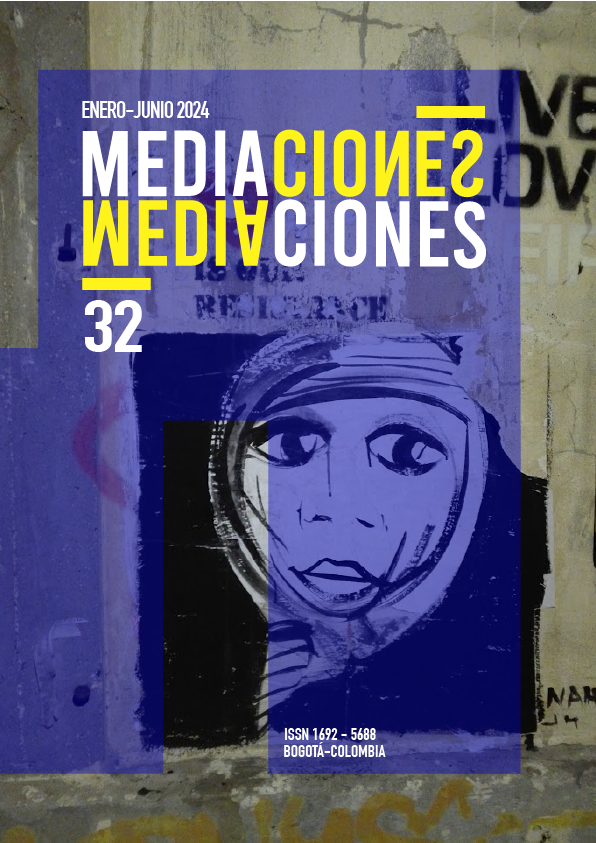Pensar la paz desde la comunicación: Desde la cultura de paz de Johan Galtung hacia la justicia comunicativa
Barra lateral del artículo

##plugins.themes.bootstrap3.displayStats.downloads##
Cómo citar
Detalles del artículo

Esta obra está bajo una licencia internacional Creative Commons Atribución 4.0.
![]()
Revista MEDIACIONES © 2024 por Corporación Universitaria Minuto de Dios - UNIMINUTO está licenciada bajo Creative Commons BY.
Biografía del autor/a
Joan Pedro-Carañana, Universidad Complutense de Madrid
Doctor por la Universidad Complutense de Madrid
Contenido principal del artículo
Resumen
La paz exige compromiso y las personas comprometidas con la paz, en su teoría y en su práctica, bien sabemos de la importancia nodal de la comunicación para la justa transformación de la realidad social y la prevención, gestión y resolución de los conflictos. El compromiso con la paz requiere de una disposición ética: podemos elegir entre afrontar los conflictos compitiendo para dirimir quién gana y quién pierde, o cooperando para lograr beneficios colectivos. La competencia redunda muy frecuentemente en violencia, ya sea en el ejercicio de la violencia física o directa, en el desarrollo de violencias estructurales e institucionales que afianzan el dominio de una de las partes, así como en el ejercicio de la violencia cultural y comunicativa que legitima, reproduce y promueve las otras violencias. En cambio, la cooperación se orienta hacia la construcción de justicia social como forma de evitar las violencias mediante la satisfacción de las necesidades de las partes.
Referencias
Arévalo-Salinas, A. l., Barranquero Carretero, A., & Herrera Barreda, D. (2024). Análisis de la relación entre comunicación, periodismo y paz. index.Comunicación, 14(1), 13-30. https://doi. org/1 O. 62008/ixc/14/0lAnalis
Fraser, N. (2023). Capitalismo caníbal: Cómo nuestro sistema está devorando la democracia y el cuidado y el planeta.y qué podemos hacer con eso. Siglo XXI Editores.
Galtung, J. (1990). Cultural violence.Journal of peace research, 27(3), 291-305.
Galtung, J. (2002). Peace journalism-A challenge. En: Wilhem, K. y Luostarinen, H. (Eds.), Journalism and the New World Order. pp. 259 272. Nordicom.
Galtung, J. (2003). Tras la violencia, 3R: reconstrucción, reconciliación, resolución. Gernika Gogoratuz.
Kundu, V. (2022). Promoting Nonviolent Communication for a Harmonious Communication Ecosystem. En: Pedro-Carañana, J., Herrera-Huérfano, E., y Ochoa Almanza, J. (Eds.) Communicative Justice in the Pluriverse: An International Dialogue (1st ed.). pp. 43-58. Routledge. https:Udoi.org/10.4324/9781003316220-4
Pedro-Carañana J. y Aladro-Vico E. (2023). Johan Galtung, los estudios, la comunicación y el periodismo de paz: trascender los conflictos subyacentes. CIC. Cuadernos de Información y Comunicación, 28, 15-24. https://doi.org/10.5209/ciyc.88846
Pedro-Carañana J. y Carrasco-Campos Á .. (2023). Presentación del número: Comunicación y Paz: Homenaje a Johan Galtung. ere. Cuadernos de Información y Comunicación, 28, 11-14. https://doi.org/10.5209/ciyc.89289
Herrera-Huérfano, E., Pedro-Carañana, J., y Ochoa Almanza, J. (Eds.). (2022). Dialogue
of Knowledges in the Pluriverse. En Pedro-Carañana, J., Herrera-Huérfano, E., y Ochoa Almanza, J. (Eds.). Communicative Justice in the Pluriverse: An International Dialogue (1st ed.). Routledge. https://doi.org/10.4324/9781003316220-2
McChesney, R. W. (2013). Digital disconnect: How capitalism is turning the Internet against democracy. New Press.
Santos, B. d. S. (2010). Para descolonizar occidente. Más allá del pensamiento abismal. Buenos Aires: CLACSO.
Wallerstein, l. (2011). Structural crisis in the world-system. Monthly review, 62(10), 31-39. https://monthlyreview.org/2011/03/01/structural-crisis-in-the-world-system/
Artículos similares
- Giordano Alvarado-Silva, INTERFACES: sobre la imaginación poética y otros artificios del lenguaje , MEDIACIONES: Vol. 21 Núm. 34 (2025): Enero - Junio. COMUNICACIÓN Y PODER
- Guiliano Dante Seni Medina, Análisis fenomenológico de las composiciones del género musical vallenato originario o juglar , MEDIACIONES: Vol. 21 Núm. 34 (2025): Enero - Junio. COMUNICACIÓN Y PODER
- Amparo Cadavid, Cicilia Krohling Peruzzo, Thomas Tufte, Reimaginando la comunicación en la creación de mundos , MEDIACIONES: Vol. 20 Núm. 33 (2024): Julio - Diciembre. COMUNICACIÓN Y CAMBIO SOCIAL
- Rosalba Mancinas-Chávez, Lucía Varela Monterroso, Juan Miguel Orta Vélez, Configuración del poder global en la era digital. Actualización del panorama de los conglomerados mundiales de la comunicación , MEDIACIONES: Vol. 21 Núm. 34 (2025): Enero - Junio. COMUNICACIÓN Y PODER
- Susana Gema Alés Álvarez, Estructura de la información en la comunicación alternativa. El caso de El Salto , MEDIACIONES: Vol. 21 Núm. 34 (2025): Enero - Junio. COMUNICACIÓN Y PODER
- Gabriela Nelida Lucero, Fotografía para el cambio social , MEDIACIONES: Vol. 20 Núm. 33 (2024): Julio - Diciembre. COMUNICACIÓN Y CAMBIO SOCIAL
- Julieti Sussi de Oliveira, Tendencias en las políticas culturales locales en el siglo XXI: Un análisis comparativo entre España y Brasil , MEDIACIONES: Vol. 21 Núm. 34 (2025): Enero - Junio. COMUNICACIÓN Y PODER
- Sonia Isabel Duque Pérez, “Realidad” como Problema y “Realidad” como Solución Convergencias y Divergencias: Aproximación Reflexiva a la Comunicación y el Poder desde la Agenda Setting , MEDIACIONES: Vol. 21 Núm. 34 (2025): Enero - Junio. COMUNICACIÓN Y PODER
- Jhon Esteban Morales-Quintero, Laura Macía Álvarez, Catalina Fina Ruiz, Influencia de los sellos frontales con advertencias nutricionales en la decisión de compra de frituras y alimentos procesados en estudiantes de la Universidad Católica Luis Amigó sede Medellín , MEDIACIONES: Vol. 21 Núm. 34 (2025): Enero - Junio. COMUNICACIÓN Y PODER
- Karina M. Herrera Miller, Comunicación y cambio social: territorios de sentido en disputa , MEDIACIONES: Vol. 20 Núm. 33 (2024): Julio - Diciembre. COMUNICACIÓN Y CAMBIO SOCIAL
También puede Iniciar una búsqueda de similitud avanzada para este artículo.
